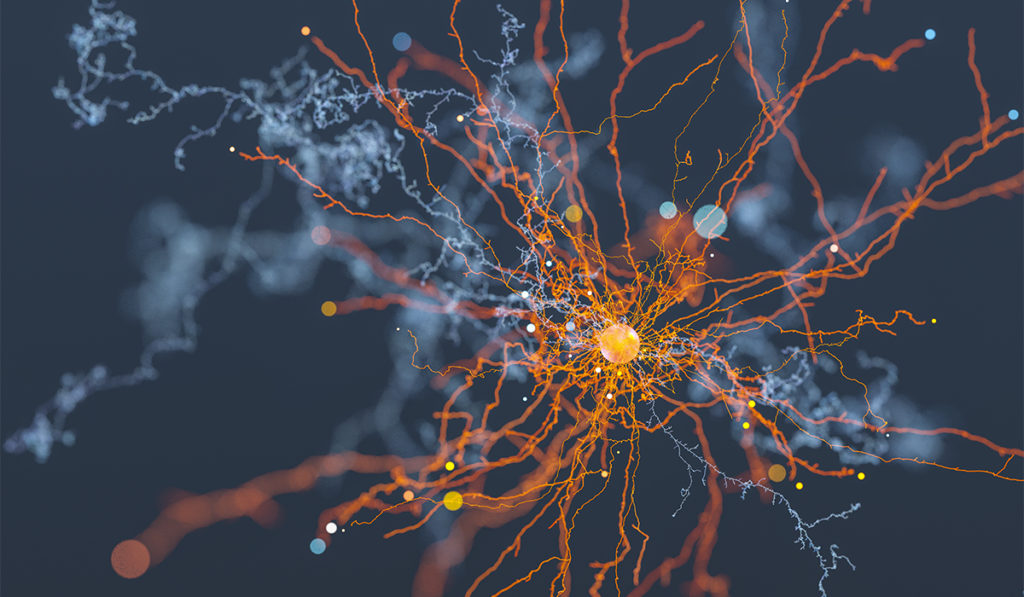Stress can cause a catastrophic collapse of the brain’s endocannabinoid system, which in turn increases anxiety, according to new research published in Neuron. The findings could help explain why some people turn to marijuana when they’re anxious or under stress.
Researchers found a lack of endocannabinoids increases signaling activity in a circuit that intertwines two (normally distinct) brain regions.
“The circuit between the amygdala and the frontal cortex has been shown to be stronger in individuals with certain types of anxiety disorders. As people or animals are exposed to stress and get more anxious, these two brain areas glue together, and their activity grows stronger together,” explained senior author Sachin Patel, M.D., James G. Blakemore Professor of Psychiatry and Behavioral Sciences at Vanderbilt University Medical Center.
“As people or animals are exposed to stress and get more anxious, these two brain areas glue together, and their activity grows stronger together.”
Stressed Mice
The endocannabinoid system offers key protections against stress. It helps prevent the two brain regions from intertwining too closely.
Patel and colleagues used mouse models to tease apart precise brain circuitry involved. The researchers found mice exposed to acute stress displayed an increase in glutamate that, over time, strengthened a reciprocal, excitatory circuit between the amygdala and prefrontal cortex.
The team zeroed in on endocannabinoid signaling mediated by “2-AG” (2-arachidonoylglycerol) in the brain. The molecule is inhibitory and serves to protect synapses against neurotransmitter spikes. (Some researchers have suggested 2-AG might even represent a viable target for mood-stabilizing medications.)
Researchers found 2-AG levels fell by as much as half in the mice. The stressed mice with low 2-AG levels spent less time exploring their environment, stayed put in mazes and displayed anxiety-like behavior. Additional behavioral tests confirmed that stress wiped out 2-AG endocannabinoid protections in the mice, increasing excitatory signaling that causes anxiety.
Implications for Anxiety Disorders
Patel is quick to note the murine findings are not “one-size-fits-all,” particularly when it comes to translating the work to humans.
“We might predict there’s a collapse in the endocannabinoid system, which includes 2-AG, in patients that go on to develop a disorder. But, not everyone develops a psychiatric disorder after trauma exposure, so maybe the people who don’t develop a disorder are able to maintain endocannabinoid signaling in some way. Those are the things we’re interested in testing next.”
“Not everyone develops a psychiatric disorder after trauma exposure, so maybe the people who don’t develop a disorder are able to maintain endocannabinoid signaling in some way.”
The researchers are now delving further into the stress-strengthened circuit they’ve identified to better understand potential compensatory mechanisms. They’re also studying how targeting 2-AG therapeutically might help restore endocannabinoid signaling.
New Insights
The study is an important step toward pinpointing how stress devastates endocannabinoid brain circuitry in the brain. It builds on Patel’s previous research describing other endocannabinoid signaling cascades involved in pain responses.
Said Patel, “We don’t know how or why this cannabinoid signaling system disappears or disintegrates in response to stress, but it results in the strengthening of the connection between two key regions and heightened anxiety behaviors in mice. Understanding what’s causing that compromise, what causes the signaling system to return after a few days, and many other questions about the molecular mechanisms by which this is happening are things we’re interested in following up on.”





